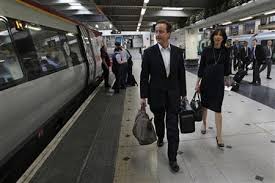British Prime Minister proposes restrictions to stop Romanians and Bulgarians from coming to the island
Vice President of the Commission: “The single market isn’t just about money, goods and services”

David Cameron, British Prime Minister, in his attempt to recover conservative votes going out the door to Nigel Farage’s UK Independence Party (UKIP), announced a plan in the Financial Times to render the freedom of movement in the EU “a little less free.” With a focus on London, Bulgarian and Romanian citizens, who starting next January, will have the same rights as all other EU partners after 5 years of transition, a change that startles the conservative Great Britain, fearing a possible “invasion.”
Because of this Cameron intends to take different restrictive measures: the new immigrants will not have unemployment benefits in the first three months without work; checks will be suspended after six months unless the worker demonstrates having a real job opportunity; residency control will be tightened; no automatic and immediate allowance for housing will be provided; anyone not actively searching for employment will be expelled for one year; and finally penalties for employers who do not pay minimum wage will be quadrupled.
But above all in his interview with the London daily newspaper, Cameron asked Brussels for “new rules that would slow full access to the labor market of another state until we are sure this won’t cause a huge migration.” For this reason the Prime Minister assumes that restrictions of movement be imposed until the GDP per capita of a country reaches a certain level of the average Europe and in any case, to allow each government to impose an annual ceiling for migrants coming from the EU. All this because in his view “things went wrong” in a system where 1 million Eastern Europeans moved to Great Britain after the expansion in 2004, when Cyprus, Czech Republic, Estonia, Hungary, Latvia, Lithuania, Malta, Poland, Slovakia and Slovenia all entered the EU together and to which Bulgaria and Romania were added three years later.
Viviane Reding replied to him today: “freedom of movement is one of the fundamental pillars of the EU, also signed by Britain.” The Vice President of the European Commission didn’t hide her disappointment in London when she recalled: “The single market is made of 4 fundamental freedoms of movement, that of capital, goods, services and people. Either you take all 4 of them or none of them. Reding reminded London that British “telecommunication companies and banks” “benefit from this free movement in Bulgaria and Romania too” and the same citizens from the island do it “to the point where in Bulgaria there are entire villages just for them.” And if that is not enough, the United Kingdom “ranks 4th among countries in the EU as an immigration destination with around 1.4 million citizens” who have left their country for another community state. So for Reding they are the last to be able to complain and anyway, the Vice President concluded, putting the community directive for free movement back on the table for discussion is out of the question. It takes a Commission proposal to change it. And the entire College of Commissioners doesn’t see the need to change the directive.”
Alfonso Bianchi






